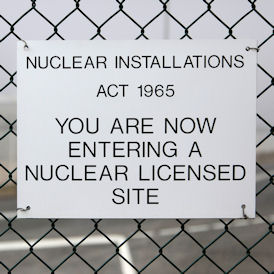British nuclear plans given all-clear post Fukushima
Britain’s chief nuclear adviser says the country’s nuclear plants are not at risk of replicating Japan’s nuclear crisis but Greenpeace tells Channel 4 News his findings are premature.

Dr Mike Weightman’s report was the basis for Energy Secretary Chris Huhne’s assessment that he “could see no reason” why the Government’s nuclear energy programme could not go ahead.
Mr Huhne told MPs safety in the industry remained the coalition’s “number one priority”, admitting the Government’s policy had been delayed following the earthquake in Japan which triggered a meltdown at the Fukushima nuclear plant.
He said he would consider all 26 recommendations made by Dr Weightman, who found existing and planned nuclear power stations in this country were of a different design to those at Fukushima.
Responding to an urgent question from Labour MP Paul Flynn (Newport West), Mr Huhne told the Commons: “Safety is, and will continue to be, our number one priority and I believe it is vitally important that the regulators and industry continue to adhere to the principle of continuous improvement for all existing and future nuclear sites and facilities.
“Dr Weightman has drawn a number of conclusions. He states that the direct causes of the nuclear accident, a magnitude nine earthquake and an associated 14 metre high tsunami, are far beyond the most extreme events the United Kingdom could expect to experience.”
Louise Hutchins, head of UK energy campaigns at Greenpeace, queried the wisdom of commissioning a report on the safety of Britain’s nuclear facilities in relation to Japan, when “we don’t even know what happened in Japan yet.”
“It is extraordinary to think that anyone could draw conclusions from Fukushima before we have any idea what happened. We still can;t get into those plants to see what damage has been caused and there are still emergency workers and engineers risking thier lives to try and bring the plant under control. This really looks like a rushed judgement to try and keep the nuclear bandwagon on the road here,” she said.
Read more: Japan's nuclear crisis special report
Mr Huhne said the Government would be willing to learn any lessons about the safety of the country’s nuclear reactors.
“My officials will review carefully the interim report but from my discussions with Dr Weightman I see no reason why we should not proceed with our current policy, namely that nuclear can be part of the future energy mix as it is today providing that there is no public subsidy.”
But Mr Flynn said the Government could not realistically expect to learn all of the lessons from Fukushima after just eight weeks, adding that today’s announcement was a public relations exercise to shore up support for nuclear power.
He said there were other threats to nuclear power stations, including terrorist attacks from the air and an extreme weather events which were being made more likely by the onset of climate change.
Mr Flynn said: “This is not about science. This is about spin. This is about PR and the whole reason for putting out this report so prematurely is to shore up collapsing public opinion and investor opinion.”
Shadow energy secretary Meg Hillier said Labour welcomed the report but said the Government would need to support the nuclear industry and could not rely on private investors alone.
She asked Mr Huhne: “Although you keep denying the subsidy issue to hide your embarrassment, will you acknowledge the need for market support to ensure we have safe new nuclear in this country as soon as possible?”
But Green MP Caroline Lucas (Brighton Pavilion) queried the Government’s stance on public subsidies towards nuclear energy.
She said: “The Secretary of State once again claims that new nuclear won’t have public subsidy and yet the Energy Select Committee in its report into electricity market reforms precisely says that it’s designed to give nuclear exactly a substantial subsidy. Could he explain why there is such a difference of view between himself and the select committee on energy?”
Mr Huhne said it was “not entirely unknown” for ministers and select committees to come to a difference of view.
He added: “The key point that I would make is that there is an enormous difference between offsetting the market failure, which as Lord Stern pointed out is the greatest market failure of all time, and subsidies directed at a particular way of doing that.”